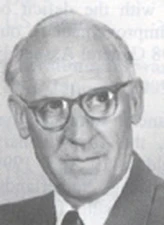Raymond Hide

The 1999 Lewis Fry Richardson Medal is awarded to Raymond Hide for his pioneering experimental and theoretical studies of the nonlinear dynamics of rotating fluids, and their application to understanding the dynamics of planetary atmospheres and interiors.
Raymond Hide needs little introduction to an audience at the EGS. He has been associated with the Society almost since its inception, and served as President in 1982-4. He has worked at a variety of institutions in the UK and the USA, including the Universities of Cambridge and Newcastle, MIT and the UK Meteorological Office, and has been a Fellow of the Royal Society since 1971. He is currently an emeritus Professor of Physics at the University of Oxford. Many of his very wide contributions to geophysics are well known. In the present context, however, we emphasise his contributions to the study of nonlinear systems and processes in hydrodynamics and magnetohydrodynamics. This work goes back to his early research as part of his PhD thesis in Cambridge in the early 1950s on the rotating, differentially-heated fluid annulus. This experiment was originally motivated by the desire to model the geodynamo in the Earth’s core, but, thanks to some chance insights at the time from Professor Harold Jeffreys, Professor Hide came to realise that his results exhibited some remarkable similarities to large-scale atmospheric circulations and weather systems. His subsequent work exerted a significant influence on theoretical developments in understanding large-scale atmospheric wave motion and instabilities (including those of Ed. Lorenz and colleagues at MIT), and demonstrated some of the now-classical routes to chaos of continuously-driven fluid flows, some 20 years before the celebrated experiments of Ahlers, Gollub, Libchaber, Swinney and others during the late 1970s and early 1980s. To date he has published around 200 refereed papers on an amazing array of geo-physical topics, ranging from the Earth’s core to the outer reaches of the Solar System (and beyond?), many of which imply the use of nonlinear processes and models. He has therefore effectively been a pioneer in the study of Nonlinear Processes in Geophysics almost “without realising it”. Last and by no means least, I have been privileged to know Raymond Hide as a friend and as an inspirational mentor and colleague for the past 19 years. It is a particular pleasure, therefore, to make the second award of the Lewis Fry Richardson Medal to Professor Hide for his pioneering experimental and theoretical studies of the nonlinear hydrodynamics and magnetohydrodynamics of rotating fluids, and their application to understanding the dynamics of planetary atmospheres and interiors.
Newsletter 71, 25, 1999
